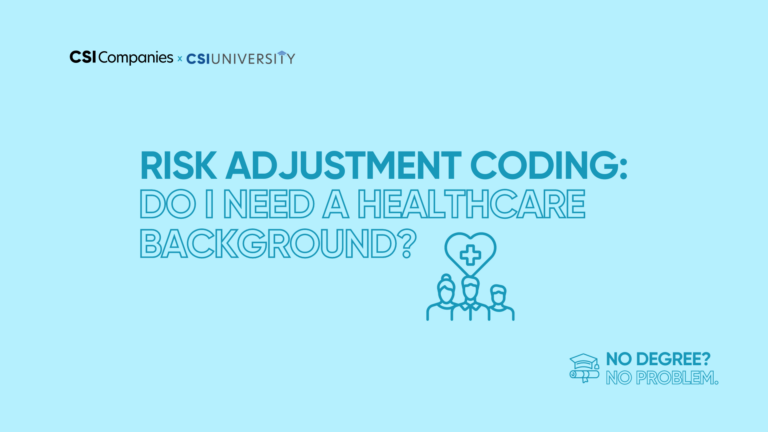No Degree, No Problem
Risk Adjustment Coding: Do I Need a Healthcare Background to Excel?

As the demand for risk adjustment coders continues to surge, there is a burning question on the minds of many aspiring professionals – is a background in healthcare a prerequisite for excelling in this field? A growing interest in flexible career opportunities has sparked this search, and answers surrounding the necessary qualifications and potential benefits that this profession holds.
Contrary to popular belief, one does not need previous healthcare experience to start the process of becoming a risk adjustment coder, or even a college degree for that matter. While having a basic grasp of medical terminology and anatomy can undoubtedly assist in navigating the learning curve, it is not a requirement.
Skills With Greater Significance
Attention to Detail: Being detail-oriented is crucial in the medical coding field. Coding error rates not only determine financial outcomes, but the care patients will receive.
Communication: Becoming a medical coder also means becoming a problem solver. Active listening skills, along with asking the right questions when needed, can assist with accurate and timely coding.
Adaptivity: Medical coders often switch back and forth between projects, environments, and guidelines. A flexible mindset is needed for success in this dynamic field.
Experience. Experience. Experience.
While one does not need to have a background in healthcare to become a risk adjustment coder, one thing is required – real experience! This raises an important question: How can aspiring coders gain experience if organizations are reluctant to hire them for this very reason?
This is where CSI Companies comes in.
How CSI Supports Coding Careers
CSI’s Risk Adjustment Coding Training Academy (RACTA) focuses on providing the training, real-world experience, and confidence to become a professional risk adjustment coder. Backed by CSI’s experienced instructors, students are first prepped to earn their AAPC Certified Risk Adjustment Coder credential. Through the innovative scenario-based learning tool, CSI Quick Code™, and immediate remedial video tool, CSI Quick Coach™, students are continually challenged to apply their knowledge to over 200 simulated charts, solidifying their proficiency in this complex domain. Furthermore, RACTA ensures that each student grasps CSI’s core competencies, emphasizing the importance of accuracy, the power of teamwork, and the support system needed to succeed in this rewarding field.
Learn more about RACTA at: https://www.csiuniversityonline.com/racta
Register for one of our upcoming info sessions to learn about the curriculum, course dates, payment plans, and more at: https://calendly.com/csi-marketing/racta-info-session
More on Risk Adjustment Coding
In the world of healthcare, risk coders are the unsung heroes who verify and ensure the accuracy of coding within the extensive health record. However, their work goes well beyond assigning codes; they must weave together an accurate picture of a patient’s health status to determine the appropriate risk adjustment factor score (RAF). This is a crucial piece of the puzzle that predicts not only the healthcare costs, but a patient’s needs in the future. Risk adjustment coding is a promising career for those passionate about clinical documentation, data analysis, and patient care. It offers an exciting path for individuals interested in inpatient care, professional fee coding, and other rewarding avenues across healthcare.